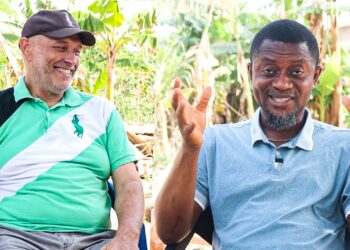Ghanaian lecturer, fashion designer, and businesswoman, Mrs. Afua Ofosu, who resides in Ontario, Mississauga, has lived in Canada for a decade. Her journey started in Ghana, where she studied home economics, agriculture, and fashion—a passion she inherited from her mother.
Growing up, Afua was passionate about fashion and design. At the age of 10, she could already use a hand-sewing machine. She studied home economics, literature, sewing, and design. When her A-level results came out, she was admitted to Takoradi Polytechnic, where she pursued fashion studies. A friend who had also written O-level exams encouraged her to study there, further igniting her passion.
After completing her advanced studies in 1998, at the age of 19, she told her mother she wanted to start her own shop and put her skills into practice. She worked in the fashion industry for two years before enrolling in a college where she specialized in drafting and sewing. She also gained experience managing people and leading a team.
Her career took a significant turn when renowned Ghanaian fashion designer Joyce Ababio opened a fashion school. Inspired by Joyce’s work, Afua studied at the school for a year, which changed her perspective on fashion. She later taught at Prince Boateng School and also worked as a lecturer at Joyce Ababio’s fashion school for two years.
Afua’s desire to expand her expertise led her to incorporate hairstyling into her business. She started a salon, added tie-dye and batik, and even invited her schoolmates to teach her additional skills. While running her shop, she was also teaching at Joyce Ababio’s school. She worked tirelessly, sometimes for 43 hours straight, to gain experience.
One day, a student recognized Afua’s talent and offered her an opportunity to teach fashion design in Zambia. The offer covered her plane ticket, accommodation, and food, so she couldn’t refuse. However, she soon realized that skilled work in Zambia wasn’t as valued, which made it difficult for her employer to meet her salary expectations. She had signed a two-year contract but completed only a year and a half before leaving.
During her time in Zambia, she met a man who encouraged her to travel abroad to utilize her skills. She was single at the time, and after getting to know him for two years, they got married. Her husband, her Zambian husband won a scholarship to study in Sweden, Norway, and England. They lived in England for six years while he pursued his Ph.D., and she completed her master’s degree.
Realizing that England was too expensive, they considered moving to either Australia or Canada. Canada responded to their applications first, so they made the move. After living in Canada for seven years, they settled there permanently and have now been in the country for 19 years.
Upon arriving in Canada, Afua secured a teaching position at one of the country’s top colleges, where she taught fashion design for two years. During this time, she lost her father, who passed away in the U.S. She traveled there for his funeral and then returned to Canada to open her own shop, Needle Talk Canada, which she ran successfully for three years before the COVID-19 pandemic disrupted operations.
After the pandemic, Afua transitioned into teaching business, supply chain management, operations, and transportation at a college. Every Saturday from 12 PM to 4 PM, she takes customer orders and sews custom-made designs while continuing to teach. She has also acquired certifications in dental nursing and patient care assistance, allowing her to work in hospitals.
However, she acknowledges that getting a job in Canada without local experience is challenging. Many employers prefer candidates with Canadian work experience, which forces many immigrants to start with volunteer work to build their résumés.
In a recent interview with DJ Nyaami on SVTV Africa’s Daily Hustle Worldwide, Afua revealed that she worked hard in Ghana before traveling abroad. She returned to Ghana in 2019 and started a large snail farm in a greenhouse business in Amasaman, near China Mall. She also drilled a borehole and sells water in the Stadium Road and Heritage College areas.
Additionally, she hopes to establish a kenkey factory and supply water to areas in need. She manages her projects in Ghana remotely with the help of a trusted project manager who provides video updates and live coverage. Despite these investments, she doesn’t plan to stay in Ghana for long and will return to Canada.
Afua and her Zambian husband have one child, and Canada remains their home. Though her husband has visited Ghana before, they feel the country has changed significantly. He once considered relocating there, but retirement plans and financial security in Canada influenced their decision to stay.
Afua notes that retirement in Canada depends on one’s financial situation. If a person has no mortgage payments, life is easier. However, since retirement benefits are based on one’s last salary, many people return to school in old age to upgrade their qualifications and earn higher salaries before retiring.
Although retirees can continue working, taxes are high, and many prefer to keep working rather than live solely on retirement benefits. Some people in Canada still work at 65, as taxation makes it difficult to rely solely on pensions. Afua prefers to stay engaged in work rather than be idle in Ghana.
She emphasizes the importance of financial planning, advising people to build credit responsibly. She and her husband were guided to buy a house before purchasing a car, allowing them to pay off their mortgage within two years. She believes financial discipline is key to success and encourages others to work together to achieve financial stability.
Needle Talk Canada remains her brand, and she continues to grow her business and career while balancing family life.
Watch The Video Below:
















